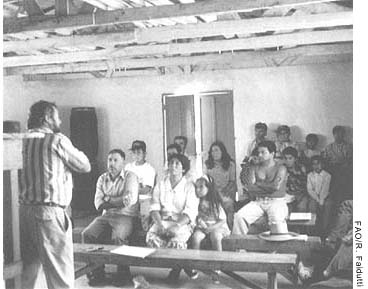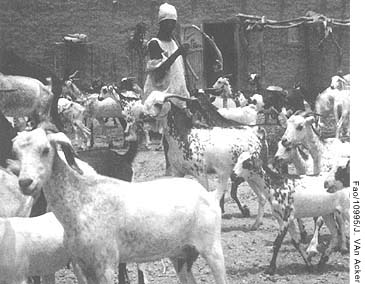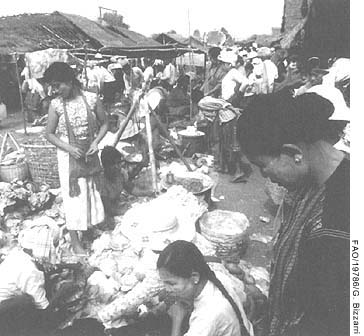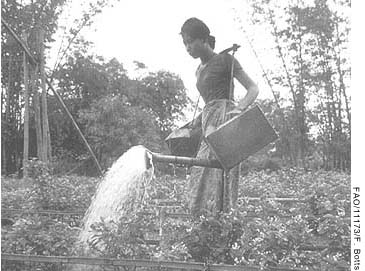
The following section offers four discipline-specific sets of guidelines for introducing nutrition objectives into agricultural research plans and programmes. The four disciplines included are policy-makers, research planners and managers, research workers and extension services. The guidelines for each discipline include suggestions for planning and implementing country specific guidelines, suggestions for establishing cooperation and collaboration with other disciplines and other development sectors, and suggestions for distributing information and introducing training to support the Guidelines as they are implemented. Because these are meant to be suggestions, or guides, that would be adapted to each country's specific situation, the assumption is that the lead sector would ensure involvement and participation of other relevant disciplines and sectors, including the private sector and NGO's.
The emphasis of national agricultural research policies is usually placed on increasing agricultural production with the application of science and technology. However, policy-makers should also be aware of the importance of including nutrition and family health issues in agricultural research programmes. Agricultural policies should be designed in such a way that they promote:
household food security, food safety and optimum nutritional status;
cost-effective and environmentally friendly poverty reduction programmes that ensure increased productivity;

There is need to include nutrition and family health issues in agricultural research programmes.
gender considerations and food-crop diversification that promote equitable intra-household food distribution;
the right to access resources that can contribute to improved nutritional status (e.g. land, credit, implements, skills training);
establishment of formal linkages, collaboration and information exchanges within all disciplines and sectors concerned with development;
involvement and participation of all stakeholders in project/programme design, implementation and evaluation;
capacity-building among beneficiaries and service providers;
development of equitable food distribution systems.
PLANNING AND IMPLEMENTATION
Developing a food security and nutrition policy within the agricultural sector also requires a strategy for its implementation. The following points offer some suggestions and supporting information that can facilitate the incorporation of this strategy into a national development plan.
National governments should consider support for household food security a development priority if poverty, food insecurity and malnutrition are to be overcome in a sustainable manner.
National agricultural policy needs to support and promote food security of nutritionally vulnerable groups.
Policy-makers should review and streamline agricultural research objectives and ensure that they are sensitive to nutrition issues.
National governments and international agricultural research centres (IARCs) can encourage their scientists to include goals of enhanced nutrition in their research proposal objectives at both programme and project levels. Goals of national agricultural policies may go beyond increasing agricultural production to include food security, income generation, equity and improved nutritional status - particularly as pertains to resource poor smallholder farmers.
Include nutrition issues in poverty reduction programmes. Since poverty reduction and nutrition are inseparable, programmes and projects for reducing poverty can be designed to address nutrition problems as well.
Agricultural research projects aimed at assisting resource-poor farmers in increasing their crop yields also should consider whether these crops will offer more nutritious foods for the family members' diets.
Available national data on poverty, food security and nutritional status should be considered when prioritizing development programmes. In particular, agricultural research and extension services should give special emphasis to the needs of resource-poor farming communities.
Provisions to counteract or avoid any negative impact on the poor should be addressed during the design or formulation phases of policy, projects and programmes. For example, a pricing policy aimed at stimulating production by the average farmer may increase the price of a food commodity, which can make that food commodity inaccessible to low income groups and thus lead to compromised food intake and nutritional status. Even if agricultural policies and programmes are not directed specifically at the poor, they still may have an impact on their lives, either positive or negative, especially concerning nutritional status, food supply, shelter, clothing, fuel, drinking water, sanitation, or availability of by-products from production activities.
Include nutrition considerations in agriculture sectoral policies, as well as in policies of other collaborating sectors such as health, education, finance, economic planning, trade, industry and NGOs. Ultimately, nutrition needs and considerations should be explicitly elaborated in the development policy. This could be achieved by establishing a board to coordinate all activities relating to nutrition.
Develop action plans on the basis of policies and national development plans in consultation with all key stakeholders in order to identify broad priority areas and build consensus; identify human and financial resources to implement the priority areas; and develop monitoring and evaluation plans.
Promote operational and problem-driven research.
Consolidate information/data systems to improve information accessibility and dissemination to researchers, extensionists and other stakeholders.
Consider local and/or regional cultural practices when formulating research policies, priorities and projects.
Establish a national multidisciplinary and multisectoral body for food security and nutrition.
Establish linkages between agricultural research organizations/institutions and farmers organizations; between agriculture and nutrition extension services and farmers' organizations; and between research institutions and extension services. At the same time, strengthen existing networks within sub-regions.
Include capacity-building for re-orientation of agricultural research workers and nutrition researchers in institutional policy.
COOPERATION AND COLLABORATION
Activities in this category have more potential for success if they are carried out jointly by nutritionists, researchers and extension workers.
Clearly define nutritional parameters of target groups and include them as part of a major criteria or component of agricultural research project evaluations.
Regularly monitor the types of foods consumed by the poor. Often research does not focus on traditional food crops if they are not export or cash crops.
Evaluate all local staple foods and traditional food crops, in collaboration with units responsible for nutrition, for possible inclusion in research programmes. Determine whether the staple foods in current research programmes play major roles in the diets and livelihoods of nutritionally vulnerable groups in terms of contribution to nutritional status, income and food expenditure. One staple food commonly consumed by the general population may be economically inaccessible to people in the lowest income groups, while another staple food may not be consumed by the majority of the population, but only by the poorest of the poor.
INFORMATION AND TRAINING
Include, within extension policies, provision for disseminating research results, information and advice to farmers. These provisions should cover all factors of production including marketing, post harvest handling, processing, utilization and nutritional qualities. Since many resource poor farmers may be illiterate, wider use of mass media, such as radio and television, (where applicable) needs to be considered.
Strengthen the nutrition component in home economics courses and incorporate nutrition into all agriculture-related training programmes, so that the linkages between nutrition and development can be understood and reinforced through training.
Create an enabling environment to promote sensitivity to equal opportunities.
These Guidelines for the planners and managers of agricultural research activities will assist in promoting the incorporation of nutrition considerations and criteria in the design of research projects and programmes, as well as in the assessment of the impact of research. The Guidelines also support the design and implementation of multidisciplinary research projects aimed at understanding the relationships between food production and nutrition, and the impact of food production on the nutritional status of resource-poor communities. Information derived from these initiatives can facilitate policy formulation as well as the development and transfer of technology.
In this document, research planners and managers refers to senior staff members who are responsible for overseeing the internal policy and research programmes, and for setting priorities for the management and organization of agricultural research at national and international levels.
The following points are proposed to encourage research planners and managers to consider nutrition and related issues as they formulate and review agricultural research programmes and projects.
Establish advisory or consultative groups at national, regional and district levels that involve all major stakeholders from agriculture, nutrition and health disciplines such as research workers, agriculture and nutrition extension workers, nutritionists, farmers, food distributors and consumers.
Invite the participation of resource poor farmers and end-users when setting research agendas, and when planning, monitoring and evaluating research activities. Production problems and specific nutritional needs should be defined and addressed.
Conduct collaborative research with participating farmers, especially in relation to activities that can improve the situation of the rural poor by meeting their nutritional needs.

Involve small resource-poor farmers and other stakeholders when planning and evaluating research activities.
Develop technologies that will enable and enhance the implementation of research recommendations.
Expand systems to include farmer and consumer involvement in agricultural research.
Establish formal and informal linkages among research institutions, extension services, individual farmers and farmers' organizations, and rural development agencies.
Develop linkage and liaison systems with extension services, nutrition institutions and adult literacy programmes.
PLANNING AND IMPLEMENTATION
Advocate for the commitment of policy-makers and research managers to endorse newly proposed research activities.
Ensure participatory decision-making by all stakeholders in the planning, implementing, monitoring and evaluating of research programmes and projects.
Build on the existing knowledge and skill of the local farming communities. Involvement of farmers in project design and implementation is particularly important because farmers participatory research approaches complement conventional research approaches. Indigenous technical knowledge and wisdom can complement formal scientific knowledge in terms of location-specific classification of the biophysical environment, and can supplement scientific explanation and prediction. Because various schemes exist for varying degrees of farmer participation, the extent of participation should be determined and clarified during the planning stage.
Include subsistence-level farmers in the assessment phase of research requirements and goals.
Include studies of local peoples' nutritional needs when planning research programmes, and use participatory decision-making to determine the means available to meet their needs.
Mobilize the necessary human and financial resources for implementing the proposed activities.
Design conceptual and operational frameworks with all relevant partners, making sure that they are all committed. Seek possible input for implementing research activities from all levels, including community, local government, national and sub-regional levels.
Include underexploited, non-conventional food plants and indigenous species in research programmes, where plausible. This has the potential to diversify the food base, improve household food security and enhance consumer nutritional status.

Local people's nutritional needs are to be considered when planning research programmes.
Collaborate with extension services and agents in order to ensure the adoption of environmentally friendly crop protection methods and continued availability of key inputs, such as fertilizers, irrigation, machinery, equipment, and appropriate seed and planting materials, which are necessary for farmers to adopt research findings and recommendations effectively.
Strengthen post-harvest research, processing and utilization activities in agricultural research institutes to make them more demand-driven and consumer-focused. Nutrition issues should be considered essential components of post-harvest and food processing research.
Develop safe and environmentally friendly technologies that do not threaten the health of users and consumers.
Provide feedback on the farming community's nutritional status for consideration by policy-makers and research managers.
Evaluate negative and positive effects of research recommendations by studying how they effect the prices of farm produce.
INFORMATION AND TRAINING
Organize workshops and/or short-term training activities, in order to provide research managers with information on how their agricultural research relates to linkages between food and nutrition situations within communities. If research managers are made aware of community nutritional needs and seasonal fluctuations in availability of appropriate foods, they will be in a position to plan appropriate research interventions.
Establish local farmers' associations that can organize educational activities for farmers concerning various farming programmes.
The following guidelines are suggested to assist research workers and project staff in taking nutrition issues into account when designing and conducting agricultural research experiments, projects and trials. In order to address the following issues and considerations in an effective manner, it is recommended that research-extension linkage committees be formed at national, regional and district levels, with the participation of all major stakeholders, including farmers, policy-makers, researchers, consumers and agriculture, nutrition and public health workers. This cluster of issues should be put on the agendas of the committee meetings.
PLANNING AND IMPLEMENTATION
Design research programmes specifically aimed at increasing the use of underexploited natural resources, including indigenous plants species, animals, mushrooms and insects. This has the possibility of improving house-hold food security, improving nutritional status of potential consumers at village level and exploring the species' roles in improved farming systems.
In plant and animal breeding improvement programmes, select breeding lines or plant materials that have developed in local environments and suit farmers' needs, including those of women farmers; evaluate promising breeds or species for attributes such as cooking properties, nutritional qualities and content of nutrients which tend to be deficient in the given population. Other properties to look for can include shelf life and amount of nutrient losses during storage, particularly in the small, subsistance farm environment.

Include underexploited, indigenous plant and animal species in research programmes.
Discuss the main objectives and possible effects of on-farm experiments with farming communities. Include discussion with any women's groups that are involved with post-harvest activities. Verify the extent that farmers will participate in research during the planning stage. This can vary from researchers' renting of the farmers' lands as sites for off-station research, to consulting with farmers for their input during the research, to collaborating with farmers to get their opinions of the need for research or of the potential for new developments. The latter, which is known as the «farmer field school concept» actively strengthens the local capacity to conduct informal research and development at farmer and community levels.
Consider the need for the multiplication, certification and maintenance of seeds or other planting materials of new or improved varieties in terms of their sustainability, and their availability for adoption and use by poor farmers.
Promote adoption of improved technologies, first ascertaining that they are affordable to resource-poor farmers.
Determine simple, practical ways to collect and disseminate information about food consumption patterns and evaluating limiting nutrients. In this way, intervention by agricultural research will be based solidly on factual information.
Involve multidisciplinary teams, including nutrition workers, in evaluations of research in progress.
Evaluate effects of research experiments on the nutritional status of recipient farming communities, including positive and/or negative effects on individual groups in the communities.
Evaluate the production costs of promising new materials in comparison to known and existing varieties.
Examine the suitability of currently recommended production and post-harvest practices for small subsistence farmers and processors, with special attention to the local environment, nutritional needs, labour demands, affordability and the overall level of economic development.
COOPERATION AND COLLABORATION
Ensure that all possible secondary uses of the promising plant lines, such as their potential to be used for forage, livestock bedding, fuel or construction, have been considered. Breeders, agronomists, animal scientists and engineers should collaborate with nutritionists and food technologists in relevant institutions to evaluate potential nutritional attributes and food quality characteristics of new varieties of crops and livestock breeds.
Open communication lines among extensionists and home economics, health and nutrition workers regarding on-going demonstrations of research results. Demonstration of research results should include all aspects of production, processing and utilization.
Involve farming communities in research work by using participatory approaches when planning and designing research projects.
Conduct on-farm trials and demonstrations with farmers and extension workers.
Ensure that the products of research are presented in a format that will be understandable, applicable and acceptable to the target groups.
Strengthen farmer-extension-research linkages and partnerships.
CONSUMER-RELATED ISSUES
Identify and define limiting nutrients in the diet of the target group. This should be done prior to planning research projects and in collaboration with nutrition and extension agents. It can be done by conducting nutrition status surveys and food consumption studies.
Consider the food preferences of urban consumers and take them into account during plant breeding and food production. Urban consumers can be affected by food insecurity. They also can provide income to small farmers through food purchases.
Involve industries that produce and deliver inputs, such as chemical and fertilizer companies, when planning research projects.
Design and target research projects that can assist nutritionally vulnerable groups in producing food crops that can meet their nutritional requirements. Specific attention should be given to meeting the nutrients that are limiting in the diets of these groups.

Food preferences of urban consumers need to be considered during plant breeding and food production to alleviate food insecurity in this group, and to generate income for small farmers.
Develop quick and simple procedures for assessing and measuring the nutrient content and characteristics of food crops being produced by vulnerable groups, to determine the adequacy of the foods they produce in meeting their nutritional requirements.
INFORMATION AND TRAINING
Organize regular in-service nutrition education programmes for researchers and technical assistants.
Prepare suitable training materials that support research recommendations, for use by extension officers, other rural development workers and farmers.
Provide feedback of research findings relating to nutrition for research planners, policy-makers and community workers, in order to make future research more relevant to community needs.
Provide information and advice on appropriate food processing and utilization methods that reduce nutrient losses, and on specific combinations of foods that provide adequate nutrient balance.
The following points can be considered by national extension services when promoting the incorporation of nutrition considerations into the research agenda. To the largest extent possible, they should be based on a multidisciplinary team approach. In this context, extension service refers to agriculture and nutrition extension. Suggestions are offered for both extension managers and extension workers. Good progress in extension will only be achieved with strong top management and ministerial support to encourage real commitment of front line staff.
EXTENSION MANAGERS
Organize planning workshops involving all stakeholders in various regions to determine priority areas and actions to be taken.
Prioritize actions in various areas and focus initially on those high priority areas that need urgent attention.
Establish formal linkages among policy-makers, research workers, extension workers, nutritionists, farmers and consumers to ensure that production and nutritional needs of small farmers are considered by the research programme. Establishing research-extension linkage committees in which all the stakeholders are represented is a potentially effective strategy.
Employ qualified nutrition/home economics officers in extension teams if the expertise is not already available in the extension service. Nutrition experts can collaborate with agronomists and contribute to the planning, implementation and evaluation of community-level agricultural projects, based on the food needs and nutritional requirements of community members.
Provide agricultural and horticultural extension officers with access to nutrition specialists if it is not possible to employ the specialists in the extension service.
Employ subject matter extension officers who are specialists in the areas of marketing and post-harvest handling, processing and utilization.
Employ enough extension personnel to cover farming communities and provide adequate resources for staff members to perform their duties.
Establish multidisciplinary departmental/ministerial extension teams, under the guidance of competent team leaders, to coordinate and supervise regional extension services.
Provide opportunities for extension management to communicate effectively with research, nutrition and crop production specialists to increase the potential for successful project implementation.
EXTENSION WORKERS
Cooperation and collaboration
Initiate joint trials with research institutes and farmers. This collaboration will contribute to the multidisciplinary team perspective.
Establish closer liaison between departments of agriculture and of health.
Establish communication and collaboration among nutrition, home economics and extension officers. This will facilitate the exchange of information and provision of advice; and in the production of crops suitable for domestic preservation and storage.
Obtain guidance from local specialists and other experts to ensure that proposed technologies are appropriate for the intended beneficiaries. Differences in physical capacities of women and men and their respective social responsibilities should be considered when designing or introducing new technologies.
Information and training
Provide farmers with information on reduction of post-harvest losses, handling, and short-and long-term storage for preserving the nutritional quality of foods. This is in addition to agronomic advice.
Assist farmers with information on proper and efficient use of irrigation systems, especially in those situations where available irrigation water is scarce. Advise on timing of irrigation activities that will conserve the supply.
Provide information and advice on the production, marketing, processing and utilization of underexploited traditional food crops and indigenous crop species.
Assist farmers in rain-fed areas with planning advice, so they have a better understanding of appropriate times for planting and harvesting.
Provide information and advice on crop production techniques and husbandry practices in order to minimize crop losses and to improve crop hygiene.
Promote the adoption of integrated pest and crop production management practices for environmentally safe crop production and utilization.
Organize training sessions and workshops for nutritionists and agricultural extension agents in which they become sensitized to each others needs, and develop better understanding and respect for each other's disciplines.
Introduce nutrition topics into the curricula of agricultural colleges and into non-formal education training sessions.
Provide information and advice to farmers and growers regarding on-farm seed production (to include vegetatively propagated material) and regarding secure, on-farm storage of seed and planting materials. This can help ensure timely sowing and planting, resulting in improved food security.
Provide agronomic and nutrition information and advice to farmers and growers who specialize in the production and distribution of seeds, planting materials and nursery stock.
Prepare simplified training materials to accompany research recommendations. These can be used by other extension workers, farmers, rural development workers and other end-users. This can be done by extension officers who are subject matter specialists and nutritionists.
Prepare detailed guidelines that enable extension agents to use simplified nutrition training materials more effectively. This can be done through collaboration among extension, nutrition and crop production specialists.
Train extension and nutrition workers in the production and distribution of training materials and information leaflets for nutrition education of the rural poor.
Facilitate farmer experimentation and group training in farmers' field schools. This will empower resource poor farmers to make more informed decisions about sustainable crop production.

Vegetable gardens should be designed such that they provide the necessary micronutrients and there is continuity of supply throughout all seasons.
Planning and implementation
Develop and maintain demonstration gardens at village level that demonstrate the concepts of continuity of supply and improved household food security by producing a range of crop species that can enhance the nutritional status of individuals in the community.
Assist farmers and growers in planning and producing crops that offer continuity of supply, with emphasis on a wider range of crops species and varieties that can provide improved and balanced diets.
Conduct regular discussions, inspections, and monitoring of the above strategy, in order to assess progress.